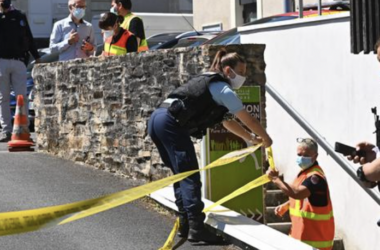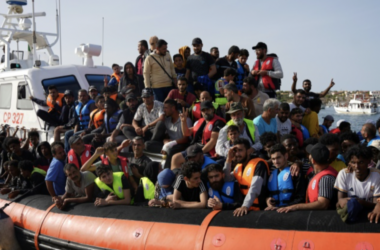Germany’s entrenched, globalist political elite joined forces in Sunday’s televised debate, making one thing clear—their biggest fear isn’t each other, but the rise of Alternative für Deutschland (AfD).
Olaf Scholz (SPD), Friedrich Merz (CDU), and Robert Habeck (The Greens) set aside their so-called ideological differences to launch an all-out assault on AfD’s co-leader, Alice Weidel, completely shutting her party out of serious political discussion.
The debate covered security, immigration, and foreign policy—hot-button issues that have AfD surging in the polls. Notably absent? Climate change. Even the Greens steered clear of their usual doomsday rhetoric, a sign that Germany’s economic woes have made sustainability policies a political death sentence. If the climate lobby is backing off, it’s proof that the winds of change are blowing.
Right from the start, Scholz attacked Merz for even entertaining AfD’s support on a parliamentary motion. Desperate to maintain the political firewall keeping AfD isolated, Merz played along, vowing to “keep the AfD viper away.” But when the topic shifted to immigration, that’s when tensions exploded.
The Munich attack by an Afghan asylum seeker exposed the harsh reality of Germany’s border policies, making AfD’s stance on migration look more like common sense than ideology. Merz blasted Scholz, pointing out that in just four days, as many illegal migrants enter Germany as are deported in an entire month. Scholz weakly claimed border crossings had dropped by 100,000 last year, but Merz conveniently left out any criticism of his party’s own disaster—Angela Merkel’s 2015 open-border catastrophe that invited over a million unchecked migrants.
Weidel, however, went straight for the jugular. She demanded stronger borders and mass deportations, a position that’s resonating with fed-up Germans. The case of the Afghan attacker in Munich—who had his asylum request denied in 2020 but was handed a residency permit in 2021—perfectly illustrated AfD’s point. “This is what happens when political correctness trumps public safety,” Weidel declared.
Habeck weakly attempted to defend his party’s pro-migrant policies, but even within the Greens, that stance is losing traction. The political landscape is shifting, and AfD is setting the agenda, whether the establishment likes it or not.
Foreign policy also sparked fierce clashes. Scholz, Merz, and Habeck sang the same tune—unwavering support for Ukraine and condemnation of AfD’s calls for Germany to play a neutral role. Merz even claimed Putin had NATO “in his sights” and that the war threatened the “entire political order built since 1990.” Weidel, however, dismissed the fear-mongering, arguing that Donald Trump is “the right man” to bring an end to the war. And she didn’t hesitate to highlight AfD’s growing international support, citing U.S. Vice President JD Vance’s fiery speech in Munich, where he slammed Germany’s political firewall, insisting that millions of voters cannot be silenced.
Polling remains tight as election day looms. The CDU leads with about 30%, AfD holds a solid second place at 20%, and SPD and the Greens lag behind in the 14-16% range. With a sizable number of undecided voters, anything could happen in the campaign’s final stretch.
What’s undeniable is that AfD has rattled Germany’s establishment. The old parties have closed ranks, terrified that their decades-long grip on power is slipping. But by isolating AfD, they might be fueling its rise as the only true anti-establishment force.
Merz now faces a crucial choice: stick with the failing status quo or break the firewall, embrace AfD’s influence, and trigger a seismic shift in German—and European—politics. That’s exactly what the left fears most. If AfD is legitimized, their reign is over. And with Germany’s elections just days away, the fate of the European Union itself could be on the line.




